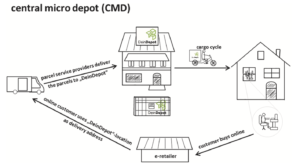B2C e-commerce is still one of the fastest-growing marketing channels yielding less bundled direct-to-consumer deliveries. Last-mile deliveries cause costs and emissions especially in urban areas with a high density of online customers. Therefore, stakeholders in the context of last-mile parcel deliveries are interested in implementing efficient, innovative, and ecological last-mile concepts.
Additionally, such concepts must fulfill the requirements and expectations of online customers as parcel recipients because last-mile delivery is the critical link between an online purchase and the delivery to the address stated by the customer. In a customer-driven central last-mile micro depot (CMD) project a potential analysis was carried out for the implementation of a CMD with the aim of environmentally-friendly and bundled last-mile delivery.
A paper by Tobias Hagen and Sabine Scheel-Kopeinig from the Research Lab for Urban Transport ReLUT tried to close a research gap by examining acceptance and willingness-to-pay for an alternative last-mile delivery concept from the perspective of the customer. The empirical results based on a survey among German major city residents indicate that city residential area are potentially more suitable for the realization of a CMD-project than other areas. Furthermore, younger and employed inhabitants are most willing to use the CMD. Based on a statistical model they were able to predict values for the willingness to pay per parcel for a specific population of urban inhabitants.
A high proportion of the population in cities (60%) would be interested in participating. However, only 36% are willing to pay in addition to the usual parcel delivery charges; 26% are willing to pay €1.00 or more.

